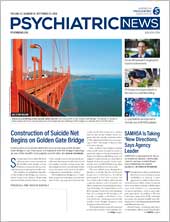The American Academy of Sleep Medicine (AASM) recommends image rehearsal therapy (IRT) as first-line treatment for PTSD-associated nightmares and nightmare disorder in adults, a new position paper states.
IRT, a modified cognitive-behavioral therapy, is one of nearly three dozen behavioral, psychological, and pharmacologic options to treat nightmares in adults reviewed by an AASM panel of sleep experts with clinical expertise in treating nightmares. The panel reported its conclusions in the June Journal of Clinical Sleep Medicine.
To develop the review, the panel assessed findings from more than 100 scientific articles on nightmare disorder therapies published between March 2009 and August 2017. The panel’s paper updates a best practice guide on the same topic that AASM published in 2010.
Patients using IRT are encouraged to imagine a more positive outcome for a nightmare’s storyline or theme and then to rehearse the new scenario mentally 10 to 20 minutes a day. Nine randomized, controlled trials enrolling nearly 800 subjects found IRT effective in reducing nightmare frequency and distress in both people with nightmares associated with posttraumatic stress disorder (PTSD) and those with no known etiology, the panel said.
About 4 percent of the U.S. adult population experiences nightmare disorder, often in association with psychiatric disorders, such as depression, anxiety, or PTSD, Timothy Morgenthaler, M.D., a professor of medicine at the Mayo Clinic College of Medicine and panel chair, told Psychiatric News.
Nightmare disorder is marked by repeated occurrences of extended, dysphoric dreams that usually involve threats to survival, security, or physical integrity. Some people find their dreams so disturbing they start to fear going to sleep, Morgenthaler said. When they do sleep, they may awaken frequently.
Indeed, he said, many visit primary care providers or sleep specialists to seek treatment for disturbed sleep rather than nightmares. Some report difficulty concentrating and other problems with daytime functioning. “I use IRT in my own practice,” Morgenthaler said.
The most studied nightmares are those associated with PTSD, the panel found. Up to 80 percent of people with PTSD report having nightmares. The presence of nightmares following a traumatic experience commonly predicts subsequent onset of PTSD, the panel noted. Nightmares may persist even after PTSD resolves.
The current gold-standard diagnostic interview for PTSD is the Clinician Administered PTSD Scale (CAPS), developed by the National Center for PTSD, the panel said. CAPS is a structured interview that uses standard questions and behaviorally anchored rating scales to assess the frequency and intensity of 17 symptoms, which include PTSD-associated nightmares.
Successful treatment of nightmare disorder usually improves sleep quality and reduces insomnia symptoms, daytime fatigue, and sleepiness. (See box for treatment guidelines.) ■
“Position Paper for the Treatment of Nightmare Disorder in Adults: An American Academy of Sleep Medicine Position Paper” can be accessed
here.
